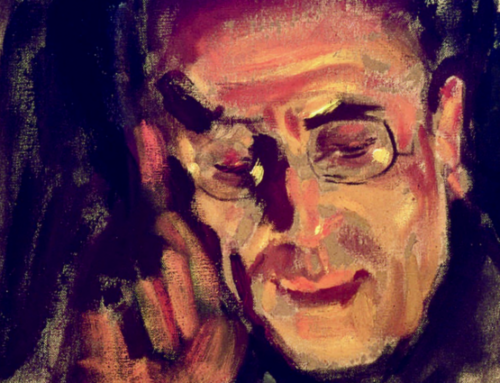If American philosopher William James offers no systematic defense of religion as Aquinas did, that was never his intent; what he does is show that faith is in tune with man’s nature, experience, and aspirations. That, it seems to me, is nothing to disparage and indeed something to celebrate.
 Preparing a study guide recently for Pragmatism, the signature work of the American philosopher William James, was for me a refreshing experience. James (1842–1910) is easily one of the most lucid philosophical writers I have encountered, with a charming and genial writing style, so redolent of the lyceum world of turn-of-the-century America. The lectures that make up the small book are addressed to lay lovers of wisdom, to amateurs (that is, lovers) of philosophy rather than to scholarly specialists or academics. These are great assets. Another is the keen attention shown by James to questions of faith. One of the first modern psychologists, James was not content to stay in the laboratory but instead turned to philosophy and religion, his other great passions. In attempting to encapsulate James’s thinking I had the pleasure of shedding some light, for myself first of all, on an often-misunderstood school of thought.
Preparing a study guide recently for Pragmatism, the signature work of the American philosopher William James, was for me a refreshing experience. James (1842–1910) is easily one of the most lucid philosophical writers I have encountered, with a charming and genial writing style, so redolent of the lyceum world of turn-of-the-century America. The lectures that make up the small book are addressed to lay lovers of wisdom, to amateurs (that is, lovers) of philosophy rather than to scholarly specialists or academics. These are great assets. Another is the keen attention shown by James to questions of faith. One of the first modern psychologists, James was not content to stay in the laboratory but instead turned to philosophy and religion, his other great passions. In attempting to encapsulate James’s thinking I had the pleasure of shedding some light, for myself first of all, on an often-misunderstood school of thought.
Pragmatism has been prone to misunderstandings and prejudice from the start, due perhaps to the unfortunate (yet at the same time perfectly appropriate) name itself. To be pragmatic in popular usage is to pursue a kind of ruthless or unscrupulous practicality. In business or politics, someone who is “pragmatic” is often someone who cuts ethical corners in order to achieve some practical result. Similarly, a “pragmatic decision” is one that ignores principle in favor of practical judgment. Suffice it to say this is not at all what James or philosophical Pragmatism (the capital “p” may help us here) means by the term. It’s best we put all the vulgar definitions behind us as we consider this mode of thought, and particularly what it has to say about religious faith.
It must also be clearly understood what pragmatism is not. It’s not a system of thought that explains everything; in fact, it’s not really a system of thought at all. If one approaches pragmatism in that way, one will be seriously misled. James insists that pragmatism is not a doctrine, not an absolute philosophical system, but a method for testing truths. And it is a method that can very well coexist with and complement other philosophical outlooks.
What pragmatism posits as its core principle is that truths are justified by their practical consequences. Now, by “practical” James certainly does not merely mean utilitarian social goals, as is all too often assumed. By “practical” James means human belief, behavior, and the totality of human life, personal and social and spiritual. Indeed, for James “practical” meant something closer to “particular and concrete” and the opposite of “theoretical and abstract.” As we learn in the book’s final lecture, salvation itself is a practical consideration (perhaps the most practical), and in the lecture on “Some Metaphysical Problems Pragmatically Considered,” James treats the Christian belief in the Real Presence as none other than a practical application of the substance/accident idea of Scholastic philosophy—an application that makes a real pragmatic difference for the partaker of the Eucharist. Let’s put to rest, then, any notion that pragmatism is nothing but a base utilitarianism.
“The truth is what works” is one popular formulation of pragmatism. To say that “truth works” is first and foremost to say something about what truth does. One of the properties of truth, one of the reasons we know truth is true, is that it works, has good effects. By their fruits you shall know them. Truth is not merely a matter of contemplation and speculative thought; it also accomplishes things in the world. It must be emphasized that practicality is a test of what a truth means, not necessarily of the fact that it is true. James’s conception of truth is existential and experiential; truth must mean something for us; there must be a passional reason for pursuing truth.
One of the marks of truth is that it works. Falsehood by contrast does not work. Falsehood fails, sooner or later, and therefore pursuing it is a delusion. We therefore have a duty and responsibility to pursue truth and avoid falsehood. The fact that truth is good for us is one reason why we ought to value and pursue it. James sees pragmatism as providing a motive for pursuing truth, which he believes the older rationalist theory of truth as a simple agreement with reality does not provide.
One common misunderstanding about pragmatism is that it denotes relativism or making truth up as you go along. However, unlike many dogmatic-minded philosophers, James never propounds his method as the philosophy, but merely as a tool—one among many arrows in the philosophical quiver. Pragmatism, so James claims, is not a new creed at all but simply a description of what we all do already whether we realize it or not. We all test ideas against their practical consequences. As a philosophical method, pragmatism looks at consequences or the future and not merely the present or past metaphysical picture of reality. What consequences will this belief or that doctrine have? What differences will it make in my life, or the lives of others?
James’s novel suggestion is to apply this test to religious truths. By and by we will ponder what this might entail.
Pragmatism is undergirded by a theory of truth and knowledge. James makes a most unusual distinction between reality and truth. Reality is what is. Truth is our statement about reality. Fact is simply given to us, whereas truth is formulated by us through what James calls a process of verification. We understand reality through language, which is necessarily shaped by the human mind, and thus truths have within them a human element. At first, scientists believed that the laws governing the universe were absolute, but over time they realized that these laws are only “approximations,” useful ways of conceiving things rather than a direct transcript of reality.
Therefore, truth is plural. Metaphysically speaking, James espouses pluralism not monism. There are many things that make up the universe, not one absolute substance. Consequently, there are many truths which we can enunciate about reality. The fact that truth has human content accents the importance of history: truths as enunciations of reality are not absolute and eternal but evolve throughout time as man reflects on the world around him. Knowledge thus develops and progresses through history.
Pragmatism always had an interesting relationship with religious thought. Many religious believers from the start saw pragmatism and James as allies. James himself was troubled by the dominance of scientific materialism over the intellectual world and his writings testify to his desire to leave room in the modern world for faith. James came to believe that pragmatism was the ideal philosophical method because it meets the human need for a complete synthesis of thought, embracing reason, experience, science, and religious faith. A psychologist fascinated by the workings of the human mind, his studies for his great work Varieties of Religious Experience had convinced him that man had a natural need for religion and that religious experience belonged unquestionably to the category of the real.
For a few centuries philosophers had examined how the human mind or consciousness perceives objects. A very dry topic to many of us, but James cuts to the chase, building on the good old empiricism of thinkers like George Berkeley, by finding in experience a concept that ties together everything that exists. Experience, rather than some abstract concept, was for James the guide to truth and being.
Experience was thus, to James’s way of thinking, the container of reality. In Jacques Barzun’s illuminating explanation, the concept of experience “puts ideas, feelings, sensations, perceptions, concepts, art, science, faith, conscious, unconscious, objects, and so-called illusions on a footing of equality as regards being real.” And in James’s own words, “a real place must be found for every kind of thing experienced.” It was the object of James, and pragmatism, to expand our minds to accept more and more of reality, more and more of truth.
James’s view of religion was thus entirely positive and affirming. Pragmatism was, in large part, an attempt to find a method of thought that would make room for religion as well as science, faith as well as reason. James famously sees contemporary thinkers as divided between two camps: “tenderminded” rationalists and “toughminded” empiricists. James’s classification is refreshingly different, avoiding the usual stereotypes; he classes religious thinkers with the rationalists, those who believe in unshakable ideals and eternal moral values and whose dreams are constantly being punctured by the hardheaded and unromantic scientific empiricists. In a wonderful bit of American imagery, James likens the tenderminded to refined Bostonians and the toughminded to rugged Rocky Mountain folk. According to James, it is time to bring these two camps together, to find a way of thinking that unites “facts” and “values,” and James believes his pragmatic method can combine “scientific loyalty to facts” with a reverence for faith and human values. For James, the advantage of pragmatism is its ability to reconcile and harmonize.
Throughout the course of the book, James justifies a number of items of traditional religious belief through the pragmatic method. However, an adherent of more traditional Scholastic thought will have some serious questions about the route James takes to arrive at these affirmations. Let us look at a few examples. Toward the middle of his book James counterposes theism, the basic belief that the universe was created and is superintended by a benevolent God, with materialism, or the belief that “purposeless configurations of blind atoms moving according to eternal laws” are the sole basis of reality.
James points out that philosophy is not only “retrospective” but also “prospective,” concerned not only with how things came to be (the interest of the scientist studying the origins of the universe or of mankind) but also with how things are going to end up—humanity’s ultimate destiny. “The absolute things, the last things, the overlapping things, are the truly philosophic concerns.” And although there is a certain indifference in practical effect whether we ascribe the origin of the universe to blind physics or to divine providence—after all, the universe is the same either way—when we contemplate the end of all things the contrast could not be starker. For materialism cannot guarantee even a good future for matter. Instead, everything we know and cherish will finally sink into nothingness. At the end of our lives, and then at the end of time, our bodies and all material reality will turn to dust and all consciousness—all our knowledge and hopes and aspirations and dreams—will be extinguished. There was and is ultimately no point or purpose to anything. And this is what really upsets us in the materialist’s account of reality, not his contradicting the Genesis creation narrative. Evolutionary materialism is “not a permanent warrant for our more ideal interests, not a fulfiller of our remotest hopes.”
Theism, in contrast, passes the pragmatic test because it “guarantees an ideal order that shall be permanently preserved”; and the need of an eternal moral order, as James reminds us, “is one of the deepest needs of our breast.” Viewed pragmatically—viewed in terms of ultimate consequences—“spiritualistic faith in all its forms deals with a world of promise, while materialism’s sun sets in a sea of disappointment.”
The same goes for such theological issues as human free will or the theory of design in nature. The theory of free will is more plausible, passes the pragmatic test, precisely because it allows man greater freedom of action. As James beautifully puts it, “free-will pragmatically means novelties in the world, the right to expect that in its deepest elements as well as in its surface phenomena, the future may not identically repeat and imitate the past.” For James, the theory of evolution is perfectly reconcilable with theism. God evidently desired to create man through “nature’s stupendous laws and counterforces.” The universe is still guided by intelligent purpose, even if it operated through various evolutionary mechanisms. Free will and intelligent design are what James calls “theories of promise” or “doctrines of relief” because they inspire hope and confidence in the future, allowing man to live well in the present.
In his last lecture James takes the “free will versus determinism” dichotomy and turns it around, applying to the question of salvation. Alluding to the contrast he drew in Varieties of Religious Experience between the “healthy-minded” and the “sick-souled” individual, he first describes the optimistic, universalist view that salvation is assured and inevitable owing to the grace and goodness of God. In contrast to this is the view that salvation is conditional, dependent on the good will of man cooperating with God and other human beings. In this latter view, life is “a real adventure, with real danger.” James adopts the latter view as more consistent with pragmatism, because it steers a reasonable middle course between over-optimism and outright pessimism. It is also quite well in tune with the orthodox view of salvation. In making his argument, James shows us that pragmatism, contrary to what is commonly alleged, is not preoccupied only with practical utility; on the contrary, it “dwells just as much upon the world’s remotest perspectives.”
***
Here we come to the crux of the issue. We can all agree that James has admirably framed issues of belief and the consequences and stakes involved in them. But what, in the end, does pragmatism have to offer toward demonstrating the truth of these propositions? How do we get from the pragmatic usefulness of a belief to the affirmation that it is true?
The amazing thing, we discover, is that pragmatism itself can be submitted to the pragmatic test. What use does it serve for religion?
First, it seems to me that we use pragmatic arguments in much of our religious discourse whether we realize it or not. Man needs faith to live, to sustain his hopes and ideals and as a support for morality; every civilization on earth has had a religion of some kind. In making such statements, we are essentially using the necessity or usefulness of religion to man as proof that it is true. Or we cite the beauty of sacred art or the lives of the saints as demonstrations of the truth of faith; converts cite such considerations all the time as reasons for their conversion.
James similarly says that because belief in God has “worked” throughout human history—has fostered virtue and culture and civilization—it is therefore true. James’s research in Varieties of Religious Experience had led him to the conclusion that the evidence for God lay primarily in inner personal experiences rather than in rational proofs. Because he had elevated experience to a high level, it followed that such experiences of the divine were real and authentic, were bearers and signs of a higher reality. The fact is that positive “proofs” are only one possible motive leading to belief, and probably a comparatively small one at that.
In a shorter but no less important work, “The Will to Believe,” James tried to expand the scope of justifiable belief beyond the narrow confines that a strict science allowed. Applying to theistic belief the maxim “there are cases where a fact cannot come at all unless a preliminary faith exists in its coming,” he argues that theism seems to demand from us a preliminary goodwill and faith rather than demanding evidence before we give our assent. This to me is a most valuable insight about the nature of faith and one too often neglected.
For myself, I think pragmatic thought has value, in the first place because it posits the personal and social importance of positive religious faith. This is by no means a trivial point. James upholds the vital importance of religious belief in life at a time when many would be inclined to shove religion to a marginal position in society, thought, and experience. It’s often said that religion has been in a slow retreat since the early modern period; James’s thinking provides a modern philosophical warrant for the validity of religious faith.
In his well-known parable about the dog wandering in his master’s library, James implied that human experience is not all there is in the universe and that our knowledge embraces only a small part of what exists, which includes the workings of a higher power. Above all, James seems to have recognized man’s need to open himself up to wonder and transcendence, of a humility in the face of the magnitude of reality which will never be fully captured by our formulas. In the end the formulas we use to explain reality—the theory of evolution, for instance, or accounts of what started the Civil War—are only approximations. Theological doctrines too can be understood as attempting to capture ineffable realities in limited human language.
William James was by all accounts a warmhearted, beloved human being, an inspirational thinker, and a writer of beautiful prose. He was not an orthodox Christian, nor did it claim to be, but he was interested in all forms of belief and in the deepest and eternal questions. What he did was to formulate a method for looking at truth and reality which may be of use to people from a variety of philosophic perspectives.
Pragmatism is itself a mediating tool between various systems of thought and belief. The pragmatic method encourages us to see reality as multifaceted and truth—our statement about reality—as colored by the human mind and human concerns, needs, and sensibilities. Many truths exist (Truth is Symphonic, in the words of a noted Catholic theologian), and they build on each other. Pragmatism in the end fosters a humility in the face of truth, which is a tremendous gift from above and is not the private possession or special preserve of any of us.
Pragmatism thus helps us come to terms with the complexity of truth whether scientific or historical or religious. In doing so, it helps us avoid simplistic overgeneralizations, knee-jerk reactions, or false dichotomies. Pragmatism makes us aware of the multiple sides of questions, steering us away from one-sided, narrowly ideological views. Man’s mistake has often been to think that his present understandings correspond precisely to the divine one. The pragmatic method teaches us to avoid such hubris, to cultivate a sense of the grandeur and multiplicity of creation. Finally, the pragmatic emphasis on truth as historical and as a function of language helps us avoid ahistorical attitudes or presentism when we discuss ideas. As Dr. Mark Malvasi has noted in one of his essays for this journal, historical consciousness leads to “a more realistic, and thus a more chastened, understanding of human nature and the world.”
The Catholic tradition as I understand it teaches us to weigh and appreciate the good and useful aspects of any of number things of the intellect and spirit, to reap what is true and discard what is erroneous. This is true of philosophy in general, where we must pick the flowers and discard the weeds, separate the gold from the dross. There are many friendly fellow-travelers in the world of thought who have contributions to make that can help us in formulating our own thoughts and ideas. Truth should be welcomed wherever it is found, as Thomas Aquinas well knew.
If James offers no systematic defense of religion as Aquinas did, that was never his intent; what he does is show that faith is in tune with man’s nature, experience, and aspirations. That, it seems to me, is nothing to disparage and indeed something to celebrate.
The Imaginative Conservative applies the principle of appreciation to the discussion of culture and politics—we approach dialogue with magnanimity rather than with mere civility. Will you help us remain a refreshing oasis in the increasingly contentious arena of modern discourse? Please consider donating now.
The featured image is “A Fine Point” by Vibert Jehan-Georges (1840–1902), and is in the public domain, courtesy of Wikimedia Commons.







An interesting amalgam of accepting our human limitations to resolve the paradoxes of revealed “truth” and the evidence of rational analysis. “Pragmatism”, as De Sapio interprets it, indeed, offers a rational and achievable way to bolster certitude about the intrinsic value of accepting theological dogmas. However,
it is a reach to claim that it is a method of verifying the the dogmas. Mr.De Sapio has brought to the fore an indirect. contemporary way to align what our reason and experience presents with what calls for faith to accept.